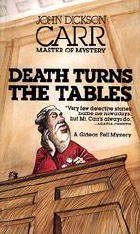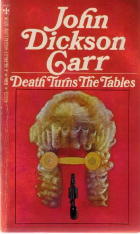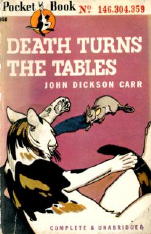Wed 9 May 2007
JOHN DICKSON CARR – Death Turns the Tables
International Polygonics 330-22; paperback reprint, April 1985. Hardcover editions: Harper & Brothers, 1941. Grosset & Dunlap; n.d; Collier, n.d. British title: The Seat of the Scornful, Hamish Hamilton, 1942. Other US reprint appearances: Two Complete Detective Books, pulp magazine, Fall 1942. Philadelphia Inquirer Sunday supplement, December 5, 1943. Hardcover reprint: Books, Inc., 1946. Paperback reprints: Pocket 350, 1945; Berkley G281, Nov 1959; Berkley F929, 1964; Berkley 1573, 1968.

When it was originally published, the book was sealed after page 193. If the reader were to have read the book to this point and still wished to do so, he could return the book to the bookseller with the seal unbroken and receive a full refund. Since I read the IPL reprint, which has only 156 pages (of small print) in total, I can’t tell you what point in the book that might have been.
[Small pause.] I’ve just checked, and the Harper edition had 256 pages, so the “Challenge to the Reader” seems to have come awfully early. In terms of the relative difficulty in solving the crime before Dr. Gideon Fell does, well, good luck on that. I don’t think that anyone is going figure out all of the details on how, when, where and why the crime is committed, no one, not anyone.
Carr was an absolute master of making his detective fiction so complicated that of course it could never happen in the real world, but once you are in place in his world, it all makes sense, in a fashion and only after the fact. In the early 1940s he was still in peak form, there’s no doubt about it. And here’s a word of advice, if you think that you’re going to give it a shot – figure it out ahead of time, that is – everything that you see (through the detective’s eyes) is going to be important, no matter how trivial it may be. Everything that anyone does is at least 99% going to come back and be important later, I kid you not.
And even so – even so, I say – there were aspects of this work of Mr. Carr, the genius craftsman that he was, that I did figure out ahead of time, but only (I think) because he got there first and they’re clichés of the field now, worn out by overuse by lesser hands.
What’s the story about, you may well ask. I think what I will do this time is to quote the blurb on the back cover. I think it sums things up exceedingly well:
AND
THE EMINENT
JURIST
But then the judge’s future son-in-law was found dead, and although there were plenty of other suspects, even Dr. Fell had to ask:
“Did Mr. Justice Ireton commit murder?”

And here’s a rather lengthy quote, but relevant, I think. Fell and Ireton are playing chess early on in the book (page 17 of the IPL edition):
The judge reflected.
“Under certain circumstances, I might. Though I doubt it. But if I did –”
“Yes?”
“I should weigh the chances. If they were strongly in my favor, I might take the risk. If they were not in my favor, I should not take it. But one thing I should not do. I should not go off half-cocked, and then whine that I wasn’t guilty and that ‘circumstantial evidence’ was against me. Unfortunately, that’s what they all do – the lot of them.”
“Forgive my curiosity,” said Dr. Fell politely. “But did you ever try an innocent man?”
The answer that Judge Ireton gives is, unfortunately, on the next page, but I submit that it will not necessarily be the answer that you may be suspecting.
The chess game at the beginning is important. It is quite obvious – I believe that it is safe to mention this – that once the dead man is found, Judge Ireton is hiding something. But is he the killer? That is where the real chess match begins.

As always, when you pick up a John Dickson Carr to read, be prepared to be confounded, and it will, I guarantee you, happen once again in Death Turns the Tables. I’m not quite so pleased with the ending, though, as I believe that Dr. Fell concedes on one crucial point far too quickly. That, along with the fact that – and I apologize for not mentioning this before – there is no “locked room,” one of Carr’s best-known specialties, makes this book rate not so highly as it might otherwise have done.
July 5th, 2022 at 12:22 pm
[…] Seat of the Scornful has been reviewed, among others, by Steve Lewis at ‘Mystery File’, Nick Fuller at ‘The Grandest Game in the World’, J F Norris at ‘Pretty Sinister Books’, […]